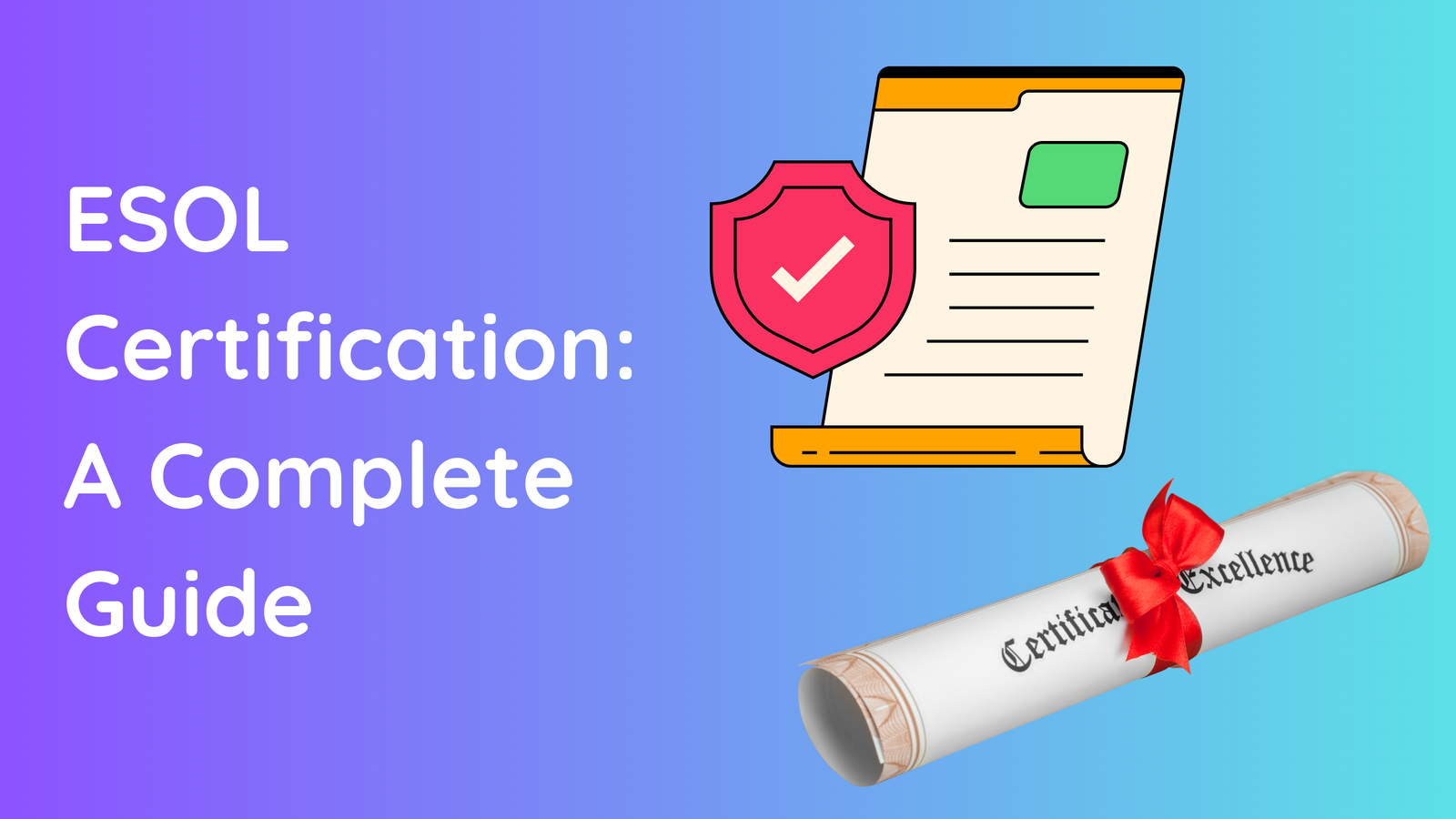What is ESOL Certification: A Complete Guide?
ESOL (English for Speakers of Other Languages) certification is a qualification designed for individuals whose first language is not English. It provides them with essential skills to communicate effectively in English, whether for professional, academic, or personal purposes. In today’s globalized world, English is often a key requirement, and obtaining an ESOL certification can open numerous doors for career opportunities, higher education, and improved language skills.
Why is ESOL Certification Important?
ESOL certification ensures that learners have a solid foundation in English, enabling them to adapt to English-speaking environments easily. It is a key qualification for non-native speakers, allowing them to pursue academic or professional goals where English is a prerequisite. Whether you’re aiming for a better job or planning to study abroad, ESOL helps break the language barrier.
The Purpose of ESOL Certification
Helping Non-Native English Speakers
The main purpose of ESOL certification is to help individuals who are non-native English speakers develop proficiency in English. ESOL certification prepares learners for real-life scenarios, such as communicating at work, participating in educational courses, or simply managing day-to-day conversations in an English-speaking country.
ESOL for Professional and Academic Development
ESOL isn’t just for conversational skills. It also offers learners opportunities for professional and academic growth. Many international companies and universities require proof of English proficiency, and ESOL certification can serve as that proof. It’s an investment in one’s future, especially in sectors where English is the working language.
Who Should Pursue ESOL Certification?
Eligibility Criteria
Anyone whose native language isn’t English can pursue ESOL certification. It is suitable for individuals at all stages, whether they are beginners looking to learn basic English or advanced speakers seeking to improve their professional language skills.
Types of Learners: Beginners to Advanced Levels
ESOL certification caters to various levels of learners, from absolute beginners (A1) to advanced (C2). Each level corresponds to different abilities, ensuring that students are placed in appropriate courses according to their skill level.
Types of ESOL Courses
General ESOL Courses
These courses are designed for learners looking to improve their overall English communication. They cover a broad range of topics, including everyday speaking, listening, reading, and writing skills.
Business English ESOL Courses
Business-focused ESOL courses target learners who wish to improve their English in a professional context. These courses often focus on industry-specific vocabulary, formal communication, and business-related scenarios.
Academic ESOL Courses
For those looking to pursue higher education in an English-speaking country, academic ESOL courses focus on writing academic papers, understanding lectures, and improving formal communication.
Benefits of ESOL Certification
Career Advancement
One of the biggest advantages of ESOL certification is the potential for career growth. Many employers prefer or require proof of English proficiency, and having an ESOL certificate can give you a competitive edge in the job market.
Improved Communication Skills
ESOL courses not only help with professional development but also boost your overall communication skills, enabling you to communicate more effectively in personal and social contexts.
Academic Opportunities Abroad
If you dream of studying abroad, an ESOL certificate can be your gateway. Many universities require proof of English proficiency, and ESOL certification can meet these requirements.
How to Get ESOL Certified?
Steps to Enroll in ESOL Programs
Getting ESOL certified starts with enrolling in a program. Look for accredited institutions or online platforms offering ESOL courses. Check their course details, duration, and exam preparation support before enrolling.
Common Course Structure
Most ESOL courses are divided into different levels, covering basic to advanced English skills. They usually include classroom instruction, interactive exercises, and preparation for the final examination.
Preparing for ESOL Exams
Study Tips for ESOL Certification
Preparing for an ESOL exam requires consistency and dedication. Make a study plan, practice regularly, and focus on all four key skills: speaking, listening, reading, and writing.
Time Management Strategies
Since the ESOL exam covers multiple sections, managing your time effectively is crucial. Allocate more time to areas you find challenging, and use past exam papers to familiarize yourself with the format.
ESOL Exam Formats and Structure
Overview of ESOL Examination Bodies
There are several reputable bodies that offer ESOL certification, such as Cambridge, IELTS, and Trinity College London. Each offers exams at various levels, from beginner to advanced.
Exam Levels (A1, A2, B1, B2, C1, C2)
ESOL exams are divided into six levels, following the Common European Framework of Reference for Languages (CEFR). A1 is for beginners, while C2 represents near-native proficiency.Common ESOL Exam Sections
Speaking
This section tests your ability to hold conversations in English and express your ideas clearly and fluently.
Listening
You will be asked to listen to recordings and answer questions based on what you’ve heard. This tests your understanding of spoken English.
Reading
In the reading section, you’ll need to understand and interpret written texts, such as articles and short stories.
Writing
This section assesses your ability to write essays, letters, or reports, depending on your level.
Where Can You Take ESOL Classes?
Language Schools
Many language schools around the world offer ESOL courses. These schools provide face-to-face instruction and tailored programs to meet your learning needs.
Online Platforms
If attending a physical class is not an option, many online platforms offer flexible ESOL courses, allowing you to study at your own pace.
The Cost of ESOL Certification
Cost Factors
The cost of ESOL certification varies based on several factors, including the institution, the location of the classes, and the exam fees. Typically, online courses tend to be more affordable than traditional in-person courses.
Career Prospects After ESOL Certification
Jobs for ESOL-Certified Professionals
An ESOL certificate can open up various job opportunities, particularly in fields that require communication with international clients. Some common roles include customer service representatives, educators, and business managers.
Higher Education Opportunities
With an ESOL certificate, you can apply to universities in English-speaking countries, making it easier to achieve academic success in your chosen field.
ESOL Certification vs. Other English Qualifications
While ESOL is a popular English certification, it’s important to understand how it compares to other qualifications like TOEFL or IELTS. ESOL focuses more on practical communication skills, making it ideal for those looking to improve their overall English, while TOEFL and IELTS are often more academic or business-focused.
Tips for Choosing the Right ESOL Course
When choosing the right ESOL course, consider your goals. Are you learning English for work, study, or personal reasons? Find a course that aligns with your specific objectives and learning style.
Conclusion
ESOL certification is more than just a qualification—it’s a tool that helps individuals unlock their potential. Whether for work, study, or personal growth, ESOL can provide the language skills needed to succeed in an English-speaking environment.
FAQs
1. What is the difference between ESOL and IELTS?
ESOL is generally broader and focuses on communication skills, while IELTS is more academic or work-specific.
2. How long does it take to get ESOL certified?
It depends on your current English level and the course you choose, but most ESOL certifications take a few months to complete.
3. Can I study ESOL online?
Yes, many platforms offer online ESOL courses that provide flexibility and convenience.
4. Is ESOL recognized worldwide?
Yes, ESOL is recognized by many institutions and employers globally, particularly in English-speaking countries.
5. How much does it cost to take the ESOL exam?
The cost varies depending on the location and the certifying body, but it typically ranges between $150 and $250.

 October 8, 2024
October 8, 2024  7 Min
7 Min  No Comment
No Comment 